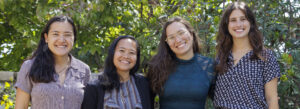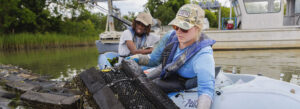Sea Grant, CERF to foster inclusion, diversity in coastal sciences through NSF INCLUDES grant
Sea Grant and the Coastal and Estuarine Research Federation (CERF) are pleased to announce a new effort funded by the National Science Foundation to create a network focused on justice, equity, diversity, and inclusion (JEDI) in coastal, ocean, and marine sciences.
The NSF INCLUDES program, Inclusion across the Nation of Communities of Learners of Underrepresented Discoverers in Engineering and Science, is a comprehensive national initiative to enhance U.S. leadership in discoveries and innovations by focusing on diversity, inclusion, and broadening participation in STEM.
The $100,000 planning grant was awarded in order to create a coalition for Coastal, Ocean, and Marine Enterprise Inclusion and Network-building (COME IN). The principal investigators on the grant are Sam Lake from Virginia Sea Grant, Susan Park from CERF, Mona Behl of Georgia Sea Grant, Treda Grayson from the Environmental Protection Agency, and Sarah Kolesar from Oregon Sea Grant.
The grant will support a series of meetings beginning in 2021 to convene scientists, stakeholders, and partners to create a community of practice that nurtures the growth, persistence, and success of students from historically excluded groups.
“We are bringing members of our community together to share their lived experiences and collectively identify ways that internship programs and professional societies can collaborate to address the existing barriers and challenges,” Lake said.
Subsequent meetings, facilitated by Thriving Inclusion, will convene smaller, focused groups that will address ways to increase inclusion, such as improved communication, recruitment practice, and mentorship needs. The results of the focus groups will be shared back to the broader group as recommendations and resources for fostering JEDI initiatives.
“I am very excited about the partnership between CERF and the Sea Grant programs,” CERF Executive Director Susan Park said. “We have all articulated a commitment to JEDI issues and I am hopeful that together, we will help move the needle on increasing diversity in marine science.”
The planning grant will also identify resources for expanding current JEDI initiatives, such as Sea Grant’s Community Engaged Internship program and CERF’s Rising TIDES program, which are dedicated to broadening participation in coastal and estuarine science and management.
This planning grant is the second NSF INCLUDES award in the Sea Grant network. The first, awarded in 2017, focused on growing STEM engagement and participation in Native Pacific Islander communities.
“It is a testament to our network’s commitment to justice, equity, diversity and inclusion,” said Georgia Sea Grant Associate Director Mona Behl, co-PI on the grant. “We are excited to learn from and collaborate with others to create a culture of inclusion and belonging in coastal, ocean and marine sciences.”
To learn more, visit the COME IN project website here.
To receive updates on this NSF INCLUDES project or to express interest in getting involved, please fill out this form.
Photos by Aileen Devlin | Virginia Sea Grant
Published December 23, 2020.
The grant will support a series of meetings in 2021 to convene scientists, stakeholders, and partners to create a community of practice that nurtures the growth, persistence, and success of students from historically excluded groups.





